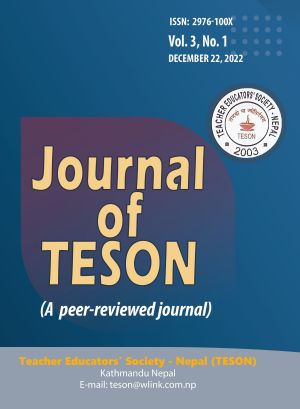(Re)thinking English Language Teacher Education: Towards Contextualized and Coordinated Efforts for Enhancing Teacher Competencies
DOI:
https://doi.org/10.3126/jteson.v3i1.51770Keywords:
English language teacher education, coordination, teacher shortages, program misalignmentAbstract
This paper explores issues around the implementation of English language teacher education programs in Nepal. It also presents the challenges facing teacher education and stakeholder opinions on future transformation of English language teacher education. The data were obtained through in-depth interviews with four teacher educators, four school heads, one assistant dean and 2 education officials. The analysis of the data adopted a grounded theory that enabled the author to build on themes emerging from the interview data, and the authors’ insider experience as an English language teacher educator further facilitated the contextual interpretation of the available data. The findings showed an existence of misalignment of the teacher education programs and contemporary market demands, thereby creating gaps between the graduates’ attributes and expectations of the schools. It further identified lack of coordination between school curriculum regulating agencies, teacher education institutions and the schools, that eventually led to the production of teaching human resources that lacked adequate competencies. This implies that English language teacher education programs needed reforms through competency-based framework. Findings further indicated a need for contextualization of current and prospective teachers’ professional development initiatives.




